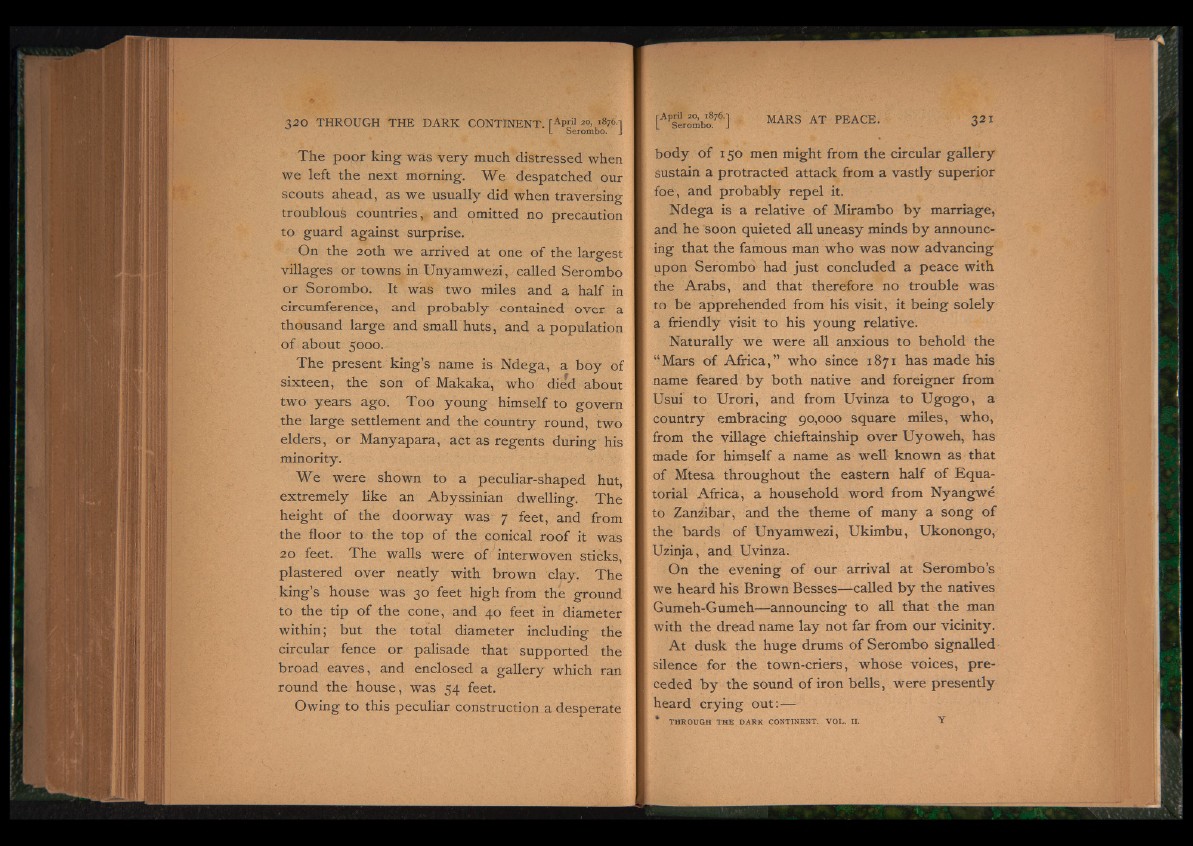
T he poor king was v e ry much distressed when
we left the next morning. W e despatched our
scouts ahead, as we usually did when traversing
troublous countries, and omitted no precaution
to guard against surprise.
On the 20th we arrived at one o f the largest
villages or towns in Unyamwezi, called Serombo
or Sorombo. It was two miles and a half in
circumference, and probably contained over a
thousand large and small huts, and a population
o f about 5000.
The present king’s name is Ndega, a b o y of
sixteen, the son o f Makaka, who died about
two years ago. T o o young himself to govern
the large settlement and the country round, two
elders, or Manyapara, act as regents during his
minority.
W e were shown to a peculiar-shaped hut,
extremely like an Abyssinian dwelling. T he
height o f the doorway was 7 feet, and from
the floor to the top o f the cpnical ro o f it was
20 feet. T he walls were o f interwoven sticks,
plastered over neatly with brown clay. The
king’s house was 30 feet high from the ground
to the tip o f the cone, and 40 feet in diameter
within; but the total diameter including the
circular fence or palisade that supported the
broad eaves, and enclosed a gallery which ran
round the house, was 54 feet.
Owing to this peculiar construction a desperate
[ApSerombo876'3 MARS AT PEACE. 321
body o f 150 men might from the circular g a lle ry
sustain a protracted attack from a vastly superior
foe, and probably repel it.
Ndega is a relative o f Mirambo b y marriage,
and he soon quieted all uneasy minds b y announcing
that the famous man who was now advancing
upon Serombo had just concluded a peace with
the Arabs, and that therefore no trouble was
to be apprehended from his visit, it being so le ly
a friendly visit to his young relative.
Naturally w e were all anxious to behold the
“Mars o f A fr ic a ,” who since 1871 has made his
name feared b y both native and foreigner from
Usui to Urori, and from Uvinza to U g o g o , a
country embracing 90,000 square miles, who,
from the village chieftainship over Uyoweh, has
made for himself a name as well known as that
of Mtesa throughout the eastern half o f Equatorial
Africa, a household word from Nyangwe
to Zanzibar, and the theme o f many a song o f
the bards o f Unyamwezi, Ukimbu, Ukonongo,
Uzinja, and Uvinza.
On the evening o f our arrival at Serombo’s
we heard his Brown Besses— called b y the natives
Gumeh-Gumeh— announcing to all that the man
with the dread name lay not far from our vicinity.
A t dusk the huge drums o f Serombo signalled
silence for the town-criers, whose voices, preceded
b y the sound o f iron bells, were presently
heard crying out:—
* THROUGH THE DARK CONTINENT. VOL. II. Y